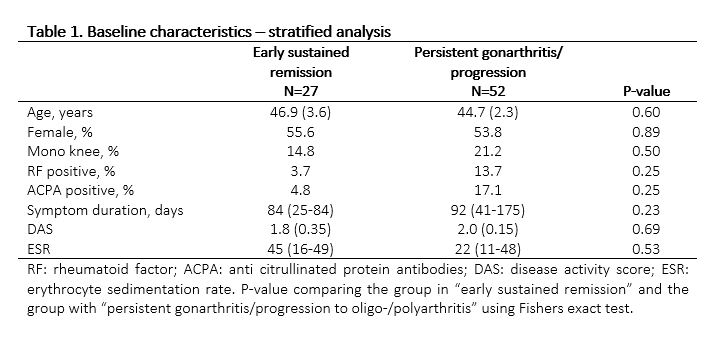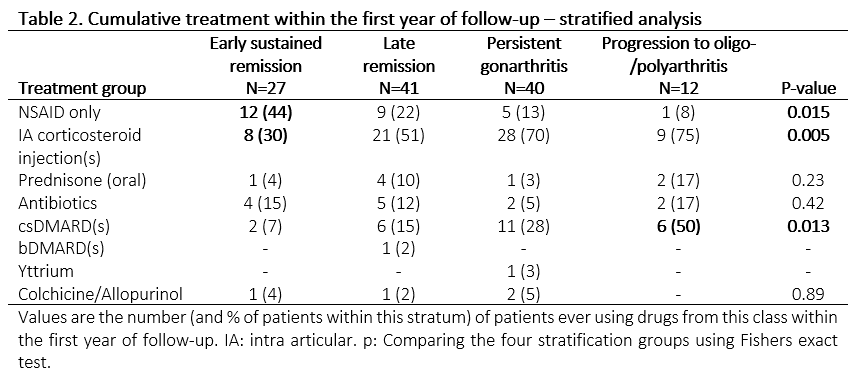Session Information
Session Type: Poster Session (Sunday)
Session Time: 9:00AM-11:00AM
Background/Purpose: Patients presenting with arthritis in one or both knees propose a challenge regarding diagnosis, prognosis and treatment decisions. The aim of the current study was to characterize patients with knee arthritis who presented to the Leiden EAC and to evaluate the disease course and treatment decisions in the first year of follow-up.
Methods: Patients with arthritis confined to the knee(s) were selected from all patients included in the EAC between 1993 and 2015. Medical files were revised for information on treatment and clinical outcomes. Baseline characteristics were summarized, treatment and outcome was evaluated at 3 and 12 months. Patients were stratified over 4 groups: 1. Early sustained remission (remission at 3 months and no flare in the first year); 2. Late remission (remission at 12 months); 3. Persistent gonarthritis at 12 months; 4. Progression to oligo- or polyarthritis at 12 months. Baseline characteristics were compared between the patients in early sustained remission and the patients with gonarthritis and/or progression at 12 months. The initial medication choices and cumulative treatment within the first year were evaluated.
Results: In total 206 consecutive patients with mono- (174, 85%), and bilateral- (32, 15%) knee arthritis were evaluated. At 12 months, 120 patients could be evaluated: 27 (23%) were in early sustained remission, 41 (34%) were in late remission, 40 (33%) had persistent gonarthritis, and 12 (10%) had progressed to oligo-/poly arthritis. In total 84 (41%) patients were lost to follow-up before 12 months (most likely not progressive or persistent). No differences in baseline characteristics were identified between the patients in early sustained remission vs. the patients with gonarthritis or oligo-polyarthritis at 12 months (table 1). The initial therapy was similar in all groups (data not shown). During the first year, in 31% patients treatment remained limited to NSAIDs, most often in group 1 (p =0.015). IACs were (also) administered to 46%, mainly in group 2, 3 and 4 (p=0.005). Prednisone was prescribed in 5% of patients. CsDMARDs (and < 1% subsequently a bDMARD) were (also) prescribed in 15% of patients (most frequently in group 4 (p=0.013)). The frequencies of other treatment did not differ between the groups (table 2).
Conclusion: Of 206 consecutive patients with undifferentiated arthritis limited to the knee(s) the majority were in remission or lost to follow up after 12 months. Progression to arthritis in other joints was relatively rare. Baseline characteristics could not predict the disease course at presentation and initial treatment choices suggest that physicians could not either. To timely start appropriate treatment, more research is needed to identify disease characteristics that predict chronicity or progression and identify patients that could profit from early, more effective therapy.
To cite this abstract in AMA style:
Maassen J, Matthijssen X, Bergstra S, Allaart C. Clinical Presentation and Disease Course Evaluation of Mono- and Bilateral Knee Arthritis: Results from the Leiden Early Arthritis Clinic Cohort [abstract]. Arthritis Rheumatol. 2019; 71 (suppl 10). https://acrabstracts.org/abstract/clinical-presentation-and-disease-course-evaluation-of-mono-and-bilateral-knee-arthritis-results-from-the-leiden-early-arthritis-clinic-cohort/. Accessed .« Back to 2019 ACR/ARP Annual Meeting
ACR Meeting Abstracts - https://acrabstracts.org/abstract/clinical-presentation-and-disease-course-evaluation-of-mono-and-bilateral-knee-arthritis-results-from-the-leiden-early-arthritis-clinic-cohort/


